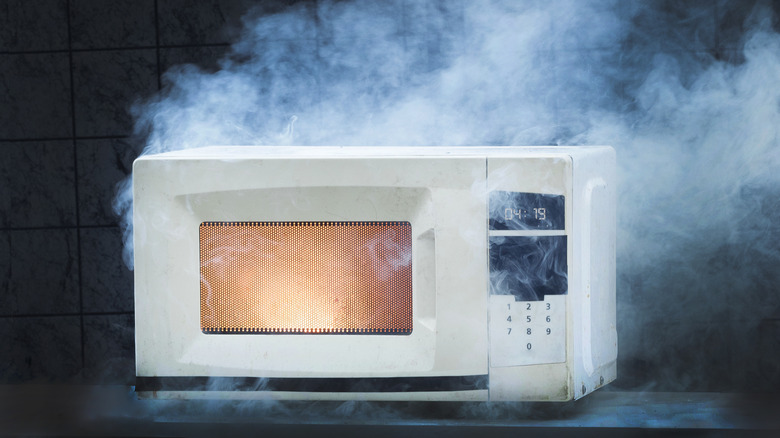What Happens If Your Fork Is Microwaved By Accident?
Most all of us have heard of the dangers of putting metal in a microwave. Perhaps you have experienced the phenomenon yourself, hoping to quickly heat up a burrito without unwrapping the foil first. Or maybe one day, while you were in a hazy morning fog, you stirred up some instant oatmeal and popped it in the microwave and forgot the spoon in there. While neither of these scenarios is ideal, the foil is much more likely to start a fire, but Wired notes that not all metal objects react the same in a microwave. However, forks are one of the most dangerous utensils to leave in the microwave.
Since the invention of the microwave in 1946, numerous changes have been made to make them smaller, more affordable, and more versatile, but the basics of the operation have not changed much. As additional reporting from Wired reveals, your microwave is powered by a device called a magnetron, which sounds like the name of a Marvel villain, but is actually a vacuum tube in which a magnetic field flows.
The magnetron generates electromagnetic waves with a frequency that just so happens to fall in the microwave range. Microwaves agitate the molecules in your food, making them vibrate and heat up. Believe it or not, this technology was first used by the British military in their radar systems during WWII.
Why some metal catches fire in the microwave
While food absorbs microwaves easily, metal does not, and microwaves get reflected off of it, sending rogue electrons bouncing around between the objects in your microwave (via New York Times). These electrons can become concentrated in certain spots within a metal object and if these spots are in contact with air, electrons will fly off the object, generating sparks. It's a scary thought, but it won't necessarily happen with every piece of metal.
You may have gotten away with microwaving a spoon before or noticed that some microwaves even have metal racks. Wired explains that pieces of thick, smooth metal heat up very slowly in a microwave, making them unlikely to spark. On the other hand, thin metal, like aluminum foil, will heat up so fast that it can catch on fire.
The body of a fork may be thick, but the tines are tapered to a thin point. Sparks have a tendency to form between the tines and if you want to know where that leads, countless YouTubers have sacrificed their microwaves, so you don't have to. Even with thick metal objects, it's safest to keep them away from your microwave.

